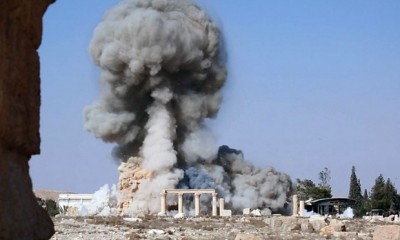
It may not mean the end for IS, whose heartlands of Raqqa, Deir Ezzor, and Mosul remain safe havens, but it is a step in chipping away at the group’s power base, both geographically and strategically, as well as debasing the myth that the caliphate’s armies are all-conquering and unable to be defeated.
Quite apart from protecting its beauty and historic importance – which IS forces have shown no respect for – reversing the fall of Palmyra is psychologically important.
The fall of the town and its historic sites to IS in May 2015 had much the same psychological effect as when IS forces rolled into Ramadi in Iraq the same month. Having suffered territorial defeats in Baiji, Tikrit, Kobani and Hassakah, IS was able to rebound almost immediately by taking both towns. In both cases, the forces of the Syrian and Iraqi state crumbled before their advance.
At the time it seemed that IS could always appear on the front foot, absorbing defeats but then rebounding and outmanoeuvring its rivals at a time and place of its choosing.
Palmyra’s fall was a huge blow to the momentum built up by the counter-IS coalition and undoubtedly set back estimations of the jihadists’ demise by months, if not years.
That Ramadi and Palmyra are now out of IS hands, without successful counter-offensives ruining the momentum, is an extremely positive sign. There is little doubt that the noose is tightening around IS and the group is clearly on the defensive.
Make no mistake, IS is still a hugely dangerous beast, able to kill innocent civilians through its relentless use of suicide bombs, most recently at a football match in Baghdad. Its forces use chemical weapons, as residents on the outskirts of Kirkuk have recently discovered, and it still retains tens of thousands of armed personnel, able to defend its key heartlands for some time to come.
The other problem, of course, is that it was not the counter-IS coalition or its allies that defeated the group in Palmyra, but the forces of Syrian President Bashar al-Assad and his Russian backers, both of whom are opposed by many key countries participating in the anti-IS coalition.
With the current political negotiations about the future of Syria’s broken politics making slow headway in Geneva, President Assad will no doubt use the advance in Palmyra to strengthen his argument that he is the only player in Syria that is truly “fighting terrorism”, and that he must be allowed to stay in order to finish the job properly.
This is a difficult argument to stomach, particularly for Western nations who have repeatedly stated that the president must leave power, and especially for the Gulf States who heavily back opposition groups fighting him, and who believe that IS’s continued strength is drawn from its position as a protector of the Sunnis from the oppression of President Assad and Iran.
How the counter-IS mission handles the next steps will be critical. If President Assad’s forces – battered after five years of war – can successfully use Russian airpower to push on east towards Raqqa, and arrive at the city before the forces backed by the coalition do, then it will most likely melt the glue holding the fragile anti-IS coalition together.
It is an unlikely scenario, due to the current weaknesses of the Syrian army, but it bears thinking about.
Both Saudi Arabia and the United Arab Emirates have promised to commit troops to the fight against IS if called upon, but Mr Assad’s forces getting in ahead of them will more or less cement his rule over the country once more. It would be a painful defeat for the Gulf in particular, and embarrassing for Western nations who are so determined to see Mr Assad leave.
There is no doubt that time is on the regime’s side. Safe from imminent collapse following a massive influx of Russian airpower last September, the regime is under no pressure to compromise at the negotiating table. The key for the anti-Assad opposition will be to show their continued support for the fight against IS as well, which would undercut Mr Assad’s appeal as the natural ally of all those seeking IS’s demise.
A recent UK Foreign Affairs Select Committee report suggested that now is the time for the anti-regime rebels and Mr Assad to put their differences aside and finish IS off once and for all. In fact, this may be the opposition’s best bet to remain relevant and effective on the ground, while simultaneously keeping its hopes in the political track alive.
Nevertheless, the galvanising effect the re-conquest of Palmyra will have on the beleaguered Assad regime will be significant, and unfortunately we should expect no significant progress in peace talks as the regime looks to cement its legitimacy, politically and militarily.
BBC

Leave a Reply
You must be logged in to post a comment.